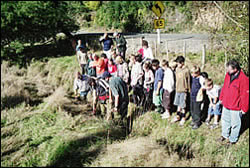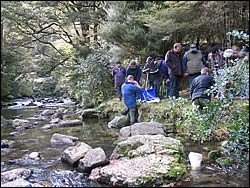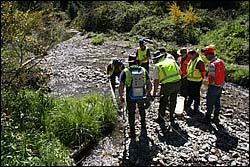Human dimensions
 |
School children from Ngatimoti School |
Introduction
The focus of this work is to develop an understanding of how to create a favourable social environment - at district and regional levels - in which science can best be used to make decisions about resource management. There are three main aspects of our work:
Improving interactions between science objectives and end-user needs:
The focus of this effort is to develop a shared understanding among researchers, stakeholders, and tangata whenua to ensure that science knowledge and outputs (e.g., DSS, technology, etc) are relevant and responsive to end-user needs.
Improving information flows:
Because science represents only a portion of the information required for on-the-ground management, there is a need to look more closely at the whole information system that supports decision making.
Effective information systems must go beyond traditional outreach mechanisms (e.g. a paper or a computer model). Instead, they must be viewed as a social system within which people interact to create new knowledge and broaden their perspectives of the world - a process called social learning.
The focus of this effort is to identify processes that improve information flows (e.g. ISKM) and to develop mechanisms to implement these processes in practice. These processes and mechanism include, for example, use of the Internet, community participatory process, and stakeholder analyses.
Improving the social environment for uptake of science information:
Even when science outputs have been developed with a high degree of awareness of stakeholder needs, ensuring that these outputs are used to support management decision-making may still be a problem.
This is often the case in catchment management issues where there are many stakeholders, many perspectives, and many - often conflicting - interpretations of what appears to be the same information.
Resolution of these issues requires development of a high degree of social capital - where the different groups involved are open to different viewpoints, there is trust between the different players, and there are well-developed communication networks.
Researchable Issues
- How can you improve the responsiveness of science research programmes to the environmental management needs of stakeholders?
- What mechanisms can be used to improve the integration of local and science research information to improve decision making?
- What innovative mechanisms can we use to deliver existing information in a form that is readily available and most useful to end-users?
Research Areas
-
Annual General Meetings
-
Arts & science collaboration
Mountains to the sea: Exploring integration and collaboration in the Motueka River catchment, -
Capacity building
-
Community reference group
The Community Reference Group (CRG) is a first point of contact to provide community views to the research partners. Group members have been appointed as individuals to bring a range of views to discussions, they are not expected to act as "representatives" for any one group. -
Community Resilience – Watershed Talk
We suggest that effective Integrated Catchment Management is as much about social processes as it is about understanding the physical functioning and management of catchment processes. Or in other words, developing community resilience alongside ecosystem resilience.
This research area is addressing the question "What tools and approaches can we use to promote effective interaction between scientists, resource managers, and the community?". One project addressing this question is ´Watershed Talk´, developed with two stakeholder groups formed within the Motueka catchment in 2006–07. -
Farm environmental planning
This research demonstrates and documents a collaborative approach to landowner environmental planning for all productive land uses within a sub–catchment -
Fine sediment: bringing the geomorphology and biology together
Suspended sediment effects on freshwater and coastal habitats. -
Futures modelling
-
Historical development
Brief account of historical development including Maori occupation. -
Identifying Maori needs
Traditionally there has been little or no involvement of tangata whenua in science and research projects. There are also nationwide problems with the level of participation and capacity for iwi to engage in resource management planning and policy, and to form effective relationships with local government and other community groups. The ICM Motueka programme is developing links with tangata whenua in order to understand tangata whenua issues, values, determine research priorities, identify information needs and research questions, improve iwi participation in science, and to ultimately improve iwi participation in resource management planning and policy. -
Institutional Learning – Research and Practice
The specific origins of this research arose from research focussed on Institutional Learning, with a focus on the interface between environmental research and resource management agencies, especially at the local government level in New Zealand. -
Knowledge interactions
-
Links between scientific and cultural indicators of river health
In this work we review the philosophies behind cultural and scientific monitoring of river health and compare the results from the two approaches at sites where corresponding data is available. -
Maori and ICM
Maori (indigenous groups) are an essential part of Integrated Catchment Management (ICM) in New Zealand. The ICM project is working closely with local Maori (tangata whenua) and associated groups, to learn how to make biophysical research more responsive to Maori needs, and for researchers to better understand Maori values and issues. We are developing an environment for social and cultural learning, collaborative research, and partnerships. Our ultimate goal is to improve decision making for the sustainable management of natural resources in catchments.
-
Science uptake by councils
The ability of resource managers, resource consent applicants and the community to arrive at decisions which promote sustainable management depends on having access to the data , knowledge and wisdom to correctly inform them. -
Sediment learning group
-
Sherry River Community
-
Social learning
-
Stakeholder issues
Key stakeholders with interests in the Motueka River catchment were surveyed in January–February 2000, to prioritise research issues relevant to natural resources management in the catchment.
The project was commissioned by the Tasman District Council, as an integral part of activities associated with the development of a research programme funded by the Foundation for Research, Science, & Technology, entitled "Integrated management of land and water resources in complex catchments" – eventually to become known as the Motueka ICM programme. -
Sustaining ecosystem services
Production, recreation, employment and community well–being in the Motueka River catchment are fundamentally dependent on the ecosystem services (water purification, soil stability, plant nutrition, pollination etc) provided by the natural assets of the catchment (soil, vegetation, biota, etc). -
Tangata Whenua
Tangata whenua are the local Maori and include a number of iwi. Two main iwi, Ngati Rarua and Te Atiawa, and their respective hapu, are regarded as tangata whenua and have a strong connection with the Motueka catchment today. -
UNESCO HELP Catchment & International links
The Motueka is one of 7 "Demonstration" catchments in the UNESCO/WMO global network HELP (Hydrology for the Environment, Life and Policy) whihc has 65 member basins. HELP is a cross–cutting initiative within UNESCO´s International Hydrological Programme. Its aim is to share ways to establish better links between environmental sciences, policy makers and decision–makers.
-
Valuing water
Allocating the rights to use a potentially scarce environmental resource requires judgements to be made about the values and opportunities to be protected, and the benefits and costs of different allocation mechanisms. These judgements depend on good information including the economic costs and benefits involved.
 |
 |
Iwi environmental monitoring field trip |
Sediment learning group field trip |
Publications (Selection)
Presentations (Selection)
Primary Contacts:

|
Will Allen
Email Phone: 03 321 9600 More details» |
Institute Landcare Research |
Expertise participation, multi–stakeholder processes, participatory evaluation, networking |

|
Garth Harmsworth
Email More details» |
Institute Landcare Research |
Expertise environmental planning, Maori research, Maori issues, land resource assessment, GIS applications. |

|
Margaret Kilvington
Email Phone: 03 3256700 Fax: 03 3252418 More details» |
Institute Landcare Research |
Expertise collaborative learning, facilitation, evaluation |

|
Glen Lauder
Email Phone: +64 21 513161 |
Institute CommonGround |
Expertise Organisational processes and learning, multi-stakeholder facilitation, science uptake |